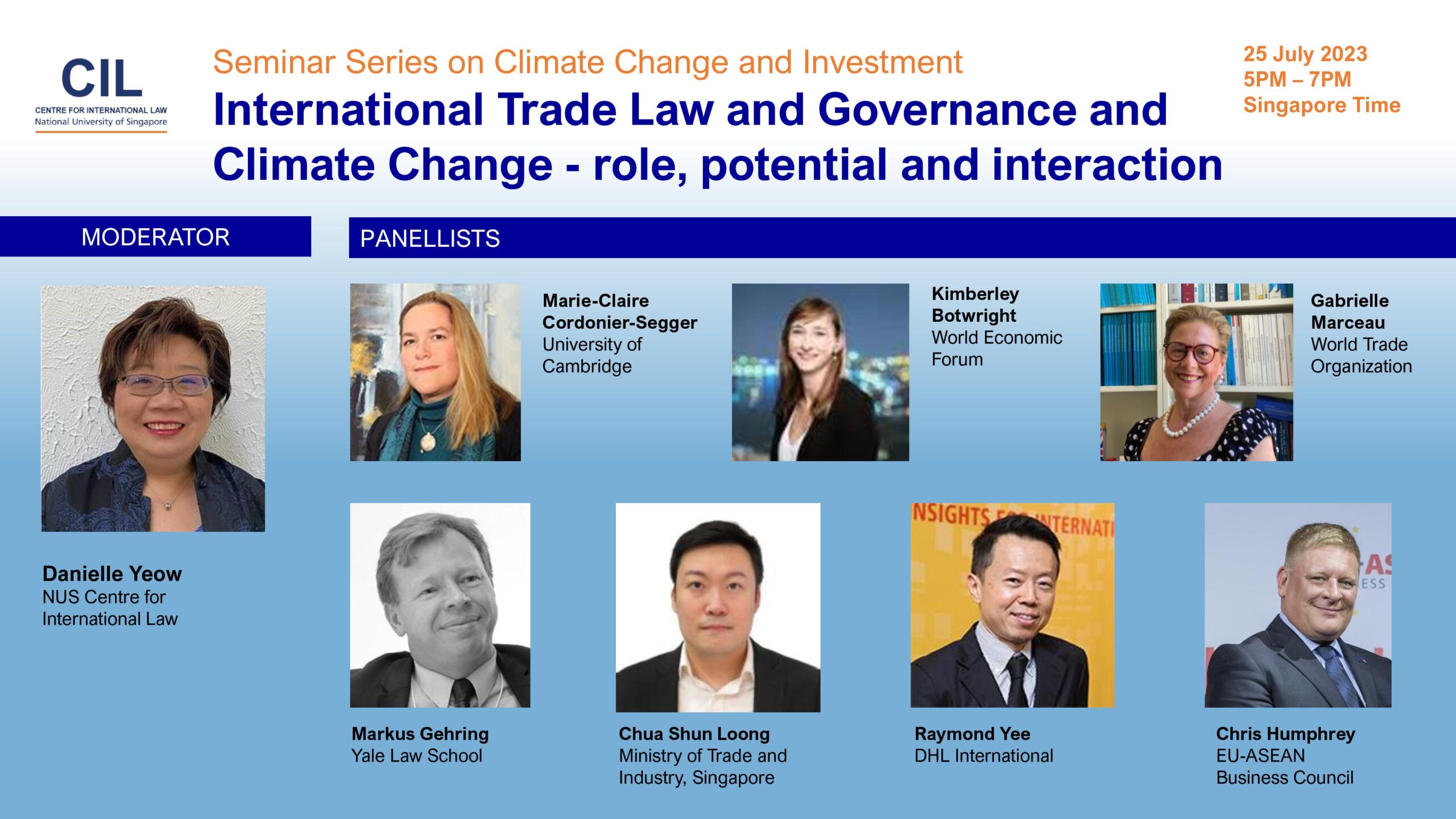Venue
Start
End
Time
Seminar 5 of 5
5:00 pm – 7:00 pm (SGT) / 9:00 am – 11:00 am (GMT) / 10:00 am – 12:00 pm (CET)
What This Seminar is About
In past instalments of this seminar series, we examined how international law and cross-border regulation can serve as a tool to support Paris-aligned investment flows throughout the investment life cycle. More information on the seminar series is available at https://cil.nus.edu.sg/seminar-series-on-climate-change-and-investment/.
This upcoming fifth seminar expands this focus to examine the potential interaction between international trade law and the Paris Agreement, especially with respect to the promotion of finance flows in support of climate change mitigation and adaptation policies.
In conceiving of this seminar, we start with the baseline proposition that not all international trade is necessarily Paris-aligned and that a question therefore arises as to whether, and if so how, states can adapt or adopt trade rules and policies with climate change and sustainable development more broadly in mind. Among the issues considered in this seminar will be:
-
- The extent to which international trade law supports climate change mitigation and adaptation and sustainable development in general.
- The challenges posed to climate goods and services by non-tariff measures.
- Recent relevant international developments addressing trade and climate change, such as ongoing discussions at the World Trade Organisation; bilateral green economy agreements; developments in recent free trade agreements in the ASEAN region; and Indo-Pacific Economic Framework for Prosperity.
- Private sector perspectives on developments in international trade policy as they relate to climate change and sustainability and the implications of these developments on industry/ corporate strategies.
Programme
Panellists
Marie-Claire Cordonier-Segger, Professor of Law, Visiting Chair of Sustainable Development Law and Policy, University of Cambridge
Markus Gehring, Lead Counsel, Trade, Investment and Finance, Centre for International Sustainable Development Law; Visiting Professor in Law, Yale Law School
Kimberley Botwright, Head of Sustainable Trade, World Economic Forum
Gabrielle Marceau, Senior Counsellor, Research Division, World Trade Organization
Chua Shun Loong, Director (North America and Central Asia), Director (Green Economy Agreements), Ministry of Trade and Industry, Singapore
Raymond Yee, Vice-President, Customs & Regulatory Affairs (APEC), DHL International
Chris Humphrey, Executive Director, EU-ASEAN Business Council
Moderator
Danielle Yeow, Lead Climate Change Law and Policy, Adjunct Senior Research Fellow, Centre for International Law, National University of Singapore
Background to the Seminar Series on Climate Change and Investment
The CIL Seminar Series on Climate Change and Investment comprises a series of seminars examining how international law can serve as a tool to support Paris-aligned investment flows. Under Article 2(1)(c) of the Paris Agreement, states have committed to strengthening the global response to climate change by, inter alia, “making finance flows consistent with a pathway towards low greenhouse gas emissions (GHG) and climate-resilient development.” It is hard to overstate the magnitude of this ambition, essentially requiring the wholesale adjustment of state economic regulation and private sector investment approaches across the globe in order to limit financial flows to carbon-intensive activities and redirect those flows to Paris-aligned ones.
The series focuses broadly on Asia. Not only does Asia account for approximately 60% of the world’s population but it is also the main GHG-emitting region in the world, accounting for approximately 50% of global CO2 emissions per year. Moreover, compared to regulatory and treaty reform discussions in Europe and North America, the situation in Asia is often overlooked. To that end, in this series we ask broadly what role states in Asia can play in creating solutions, whether through the leadership of economic blocs like ASEAN or larger economies like China, India, Japan and Korea. Moreover, we also ask whether states in Asia are willing to lead in this space.


